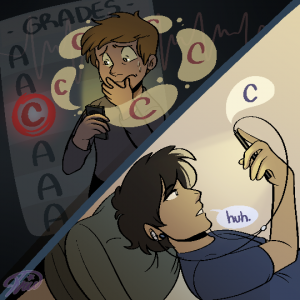
Pro by Riley Cable
Although everyone wishes for unlimited vacation and no schedule, that’s not reality. Whether in high school or a full time job, there’s always a schedule, and most of the time, they start early in the morning; there isn’t a way to avoid this structure. High school prepares students for the real world and leaves them without expectation that there is something blissful and perfect on the other side. Regardless of future plans, students need to see that life isn’t like the movies. People aren’t winning the lottery or becoming famous in a day. In reality, there is work to be done, and people need to do it. The stress of school is realistic, but it’s nothing compared to what is found outside the hallways.
Grades seem like an outdated system that only affects students, but is it often forgotten that jobs give grades too. Performance within the workplace does not go unnoticed. If an employee isn’t stocking the shelves the right way or a doctor isn’t prescribing correct medications, there will be consequences. Everything needs evaluation to improve. When a student gets a “B” that was “so close” to an “A,” now there is more drive to do better. People work hard when they want something. Handing out good grades, like handing out free money, teaches nothing. Good work ethic and responsibility are out the window as soon as students realize a grade won’t define the future. Success is driven by people with a desire for more. Even the students who do not dream of an Ivy League future can realize that their performance in school can boost or be detrimental for their entire life. Starting with school, the motivation to strive for the best pushes students to do amazing things never thought possible.
For students that have that extra determination within them, they have the opportunity to shine with AP courses. No one is required to take the extra challenging road, so those that do, usually benefit from it. Since classes are optional, students can do what they see fit. If they lack time, it doesn’t cost them a grade or ruin their future to skip out on a particular class. These classes simply add onto a student’s GPA, so the “go-getters” can aspire for valedictorian. Getting exceptional grades with these added classes proves that going the extra mile results in success. Students who push themselves and work harder should get rewarded. Doing what is asked is important, but going beyond expectations shouldn’t go unnoticed.
New technology goes even further to benefit the lives of students. Infinite campus informs students on their successes and setbacks immediately. As soon as a student realizes they missed an assignment or didn’t do as well as they hoped, they can start fixing. Changes can be made when students are aware of their faults. No one is perfect, but realizing mishaps immediately helps inspire a new mindset to do better. Moreover, getting the notification of a grade can also be a sense of gratification. Knowing all the hard work and effort paid off is a rewarding feeling that leaves students satisfied and parents proud. For those who work tirelessly, seeing an “A” come across their screen reassures them that there is a light at the end of the tunnel. Their strength is carrying them one step closer to the big future they want.
The new generation is filled with young people ready to make changes. High school gives them a chance to get their footing without instantly enduring all life’s hardships. By emphasizing the importance of hardwork, the world will be better off with a well-educated, hard-working society.
Con by Izzie Thornley
Each weekday morning, children and teens around the country wake up bright and early for a long seven hour school day. They turn off their phones’ blaring alarm clock, take an Advil for their forever throbbing head and rub the ever-growing black circles that neighbor their bloodshot eyes. It’s an everyday routine, especially for today’s teenagers who consistently stay up until two in the morning just so they can receive an “A” on their upcoming report card. After all, colleges only want the best of the best for their campuses. If a scholarship is even a possibility, students are basically required to achieve perfect grades along with exceptional standardized test scores, prominent club and sport dedication and hours upon hours of community service. With all of these chores piling up, students’ anxieties grow, until school isn’t about obtaining an education anymore; it’s about acquiring grades high enough to be accepted to an “acceptable” college while still keeping up with tons of extracurriculars, too.
At just five years old, Kindergarteners are already learning the grading system based on letters they recently learned from their newfound alphabet. Teachers and staff drill into these children the importance of letter grades and how these small markings on a progress report could influence their entire life. By the time these children hit freshman year of high school, they are exhausted and even more stressed-out. Students understand that a grade can determine the level of success they can achieve in adulthood, from taking easier classes to cheating, their focus moves to acquiring a well-rounded education toward getting a grade by any means. Consequently, grades aren’t even an accurate depiction of what a student has to offer to a university. Additionally, students never truly learn their own strengths and weaknesses for future careers when all they can worry about is a future place to earn a degree for who knows what.
For over-achieving students, AP classes, otherwise known as college credit classes, are offered throughout the United States. As if students don’t worry about their future and college enough, they are adding even more to their plate; a super stressful test that gives them the slight possibility of actually earning college credit. These classes are perfect for students who are actually interested in the course material and legitimately want to dig deeper in one or two classes, however, AP’s are being utilized as a way for honor roll students to gain some extra bonus points for their weighted GPA. Students are taking these classes even when they aren’t interested or particularly good at the subject just so they can be at the top of the high school hierarchy and fight for the next spot as valedictorian.
In addition, new technology and systems such as “Infinite Campus” send notifications to both students and parents regarding school and other information at any time of the day or night. Students can never fully separate from school, grades, and test scores because with the ding of a cell phone, a grade –and ultimately a life– could be ruined. Unlike several generations ago, today’s students can’t relax and wait until progress reports because with a few clicks of a button, they have the entire gradebook to their usage. Especially during the beginning of the quarter, these always-there apps cause detrimental effects. If only a few grades have been entered and one of them is low, one’s grade plummets. Students frantically bombard their teacher with questions about extra credit, further establishing that students aren’t looking to understand the material, but for an easy way out of the low grade trap. Just like a cyberbully, school is always there, and students can’t get away from it, even in the comfort of their own home.
School is important, but mental health and actual education should be prioritized over the anxiety of grades. Students need to take classes that they can pass without becoming too overwhelmed with anxiety and stop obsessively checking their grades on the daily. After all, they only have one childhood: go out and live it.










